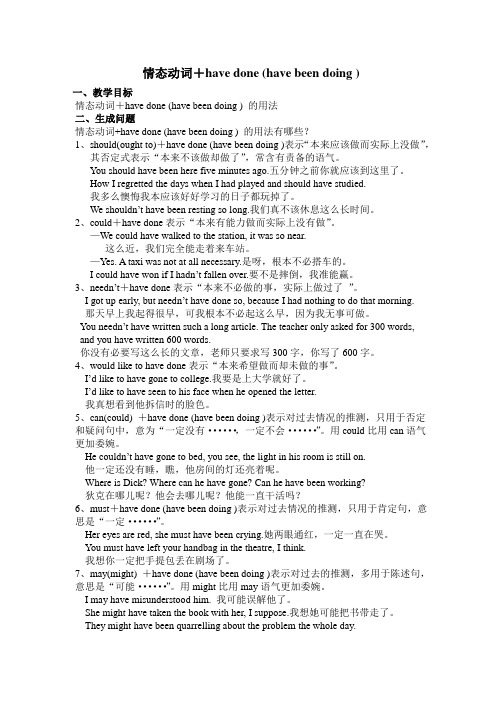“情态动词 + have done”用法盘点
- 格式:doc
- 大小:23.00 KB
- 文档页数:2

情态动词+have+done是历年高考的重点和难点之一,现将其用法总结归纳如下:一、must+have+done表示对过去事情的肯定推测,译成“一定做过某事”,该结构只用于肯定句.1. It must have rained last night, for the ground is wet. 昨晚一定下雨了,因为地面还是湿的2. You must have been mad to speak to the servant.你和仆人说话,一定是发疯了二、“can't+have+done”表示对过去事情的否定推测,译成“不可能做过某事”。
1. Mr. Smith can't have gone to Beijing, for I saw him in the library just now. 史密斯先生不可能去北京了,我刚才还在图书馆见过他。
2.Mary can't have stolen your money. She has gone home.玛丽不可能偷你的钱,她回家去了三、“can+have+done”表示对过去行为的怀疑,用于疑问句,译成“可能做过……吗?”。
1.There is no light in the room. Can they have gone out?屋里没有灯,他们可能出去了吗?2. There is nowhere to find them. Where can they have gone? 到处找不到他们,他们可能到什么地方去呢?四、could+have+done’是虚拟语气,表示对过去事情的假设,意思是本来能够做某事而没有做.He could have passed the exam, but he was too careless.本来他能通过考试,但他太粗心五、“may+have+done”表示对发生过的事情的推测,意思是“可能已经”或“也许已经”,用于肯定句中。

情态动词+have done (have been doing )一、教学目标情态动词+have done (have been doing ) 的用法二、生成问题情态动词+have done (have been doing ) 的用法有哪些?1、should(ought to)+have done (have been doing )表示“本来应该做而实际上没做”,其否定式表示“本来不该做却做了”,常含有责备的语气。
You should have been here five minutes ago.五分钟之前你就应该到这里了。
How I regretted the days when I had played and should have studied.我多么懊悔我本应该好好学习的日子都玩掉了。
We shouldn’t have been resting so long.我们真不该休息这么长时间。
2、could+have done表示“本来有能力做而实际上没有做”。
—We could have walked to the station, it was so near.这么近,我们完全能走着来车站。
—Yes. A taxi was not at all necessary.是呀,根本不必搭车的。
I could have won if I hadn’t fallen over.要不是摔倒,我准能赢。
3、needn’t+have done表示“本来不必做的事,实际上做过了”。
I got up early, but needn’t have done so, because I had nothing to do that morning.那天早上我起得很早,可我根本不必起这么早,因为我无事可做。
You needn’t have written such a long article. The teacher only asked for 300 words, and you have written 600 words.你没有必要写这么长的文章,老师只要求写300字,你写了600字。


情态动词+have done的构成及用法含译文1.情态动词+have done的构成may/might have done可能已经发生了某事could have done本能够做某事can't/couldn’t have done不可能已经发生了某事must have done一定已经发生了某事would have done本来会做某事should/ought to have done本应该做某事但没有做shouldn't/oughtn't to have done本不应该做某事但做了need have done本需要做某事但没有做needn't have done 本不需要做某事但做了2.情态动词+have done的用法情态动词+have done的用法主要包括两个方面:一.表示对过去所发生事情的推测或假设;二.表示对过去所发生事情的责备或遗憾。
①may/might have done可能已经发生了某事。
对过去所发生动作的不太肯定的推测。
用于肯定句中,may和might意思相同,但might 可能性更小,多用于虚拟语气中。
By expressing love for his children in such a special way, Tolkien may indeed have been the real Father Christmas. 通过这种特别的方式表达对孩子们的爱,托尔金可能真的是真正的圣诞老人。
(新外研版必修二)You can check his office. He might have been there already. 你可以去他的办公室看看。
他可能已经到那儿了。
If he had been given more encouragement, he might have made greater progress. 如果给他更多的鼓励,他可能会取得更大的进步。


have done的用法总结
1. “Have done”可以表示过去已经完成的动作呀,就像“我已经写完作业了”,I have done my homework.
2. 当你想说“我已经吃过饭了”,这时候就可以用“have done”呀,I have eaten.
3. 岂不是很简单?你看“他已经去过北京了”,He has gone to Beijing. 这不就是“have done”的典型用法嘛!
4. 比如说“我们已经看过那部电影了”,We have seen that movie. 这就是在告诉别人这件事我们已经做完啦!
5. 还有啊,“她已经做完家务了”,She has done the household chores. 是不是很清楚呀?
6. 再想想“他们已经准备好了”,They have got ready. 这也是“have done”在发挥作用呢!
7. 哎呀,“我已经买了这本书”,I have bought this book. 多自然的表达呀!
8. 你看,“have done”的这些用法,是不是很实用呢?
总的来说,“have done”在各种情境中都能很准确地表达过去已经完成的事情,大家一定要掌握好呀!。
“情态动词+ have done”用法盘点
1. 表推测
must have done表示对过去发生事情的肯定推测,意为“一定,准是,想必……”,只用于肯定句中。
can / could have done表示对过去发生行为的怀疑和不肯定,通常用在否定句和疑问句中,意为“不可能……”。
may / might have done表示对过去发生的情况的推测,意为“也许,或许……”,一般只用于肯定句或否定句中,不用于疑问句。
用might则表示语气更加不肯定。
如:
It’s too late. I t hink they may have gone to bed.
太晚了,我想他们可能睡觉了。
This cake is very sweet. You must have put a lot of sugar in it.
这蛋糕很甜,你一定是放了很多糖。
My sister met him yesterday afternoon, so he couldn’t have attended your lecture.
我姐姐昨天下午遇见他了,因此他不可能去听你的课。
2. 表责备
could have done用在肯定句中,表示本来能做某事,但实际上未做某事。
might have done表示本来可能做某事,但实际上未做某事。
should / ought to have done表示本应该做某事而实际上没有做;其否定式表示某种行为不该发生但却发生了。
need have done表示过去本来有必要去做某事,但事实上没有做;其否定式表示本来不必做某事但实际上却做了。
如:
You might have given him more help, though you were busy.
尽管你很忙,但你本来可以给他更多的帮助的。
You should / ought to have stopped at the red light.
你见了红灯本应该停车的。
You needn’t have taken a taxi here, for it was very near to your house.
你没必要坐出租车,这儿离你家很近。
You could have made greater progress, but you didn’t devote yoursel f to your
study.
你本来能取得更大的成绩,但你没有全身心地投入学习。
3. 用于与过去事实相反的虚拟语气中
主要有would / should / could / might have done。
如:
If we had had enough rain last year, we could have gained a good harvest.
如果去年雨水充足的话,我们可能会有一个好收成。
If you had worked hard, you would have easily passed the final test.
如果你当时努力学习的话,就会轻松通过最后的测试的。